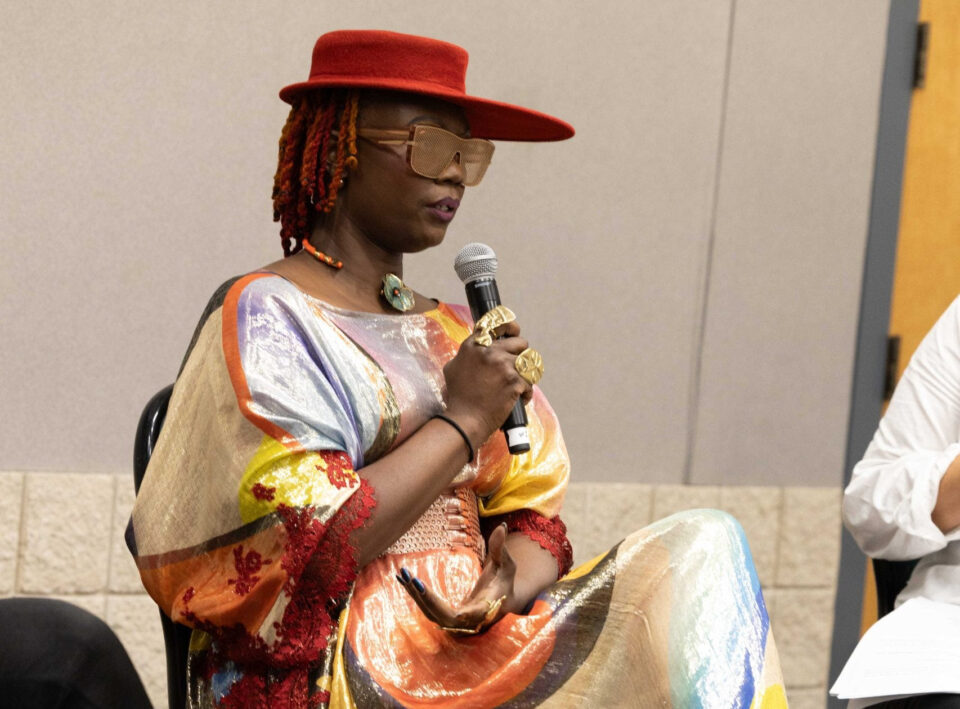Docuseries Streamed on Max; Editor Cadet Leaves
Dow Jones, NYU to Launch Workshop for Black Men
Added Aug. 9: D.C.’s Carol Randolph, ‘Extension of the Community’
Plus: Family Obituary for Carol Randolph
Homepage photo: Caroline Wanga, president and CEO of Essence Ventures, at NABJ panel (Credit: Essence)
Support Journal-ismsDonations are tax-deductible.
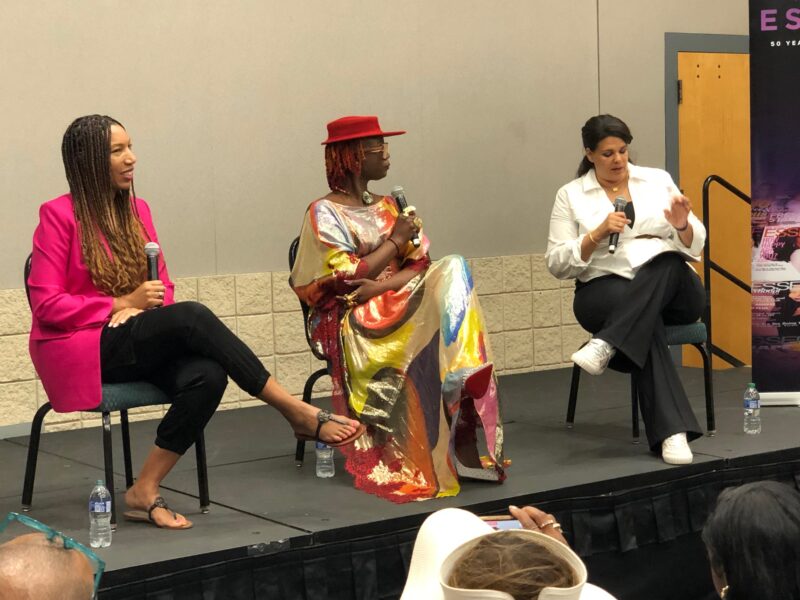
Docuseries Streamed on Max; Editor Cadet Leaves
“Time of Essence,” the Oprah Winfrey Network’s five-part docuseries on the story of Essence magazine, will be streamed simultaneously on Max, multiplying its audience, OWN’s director of programming, Kai Bowe, said Saturday. The series begins Aug. 18.
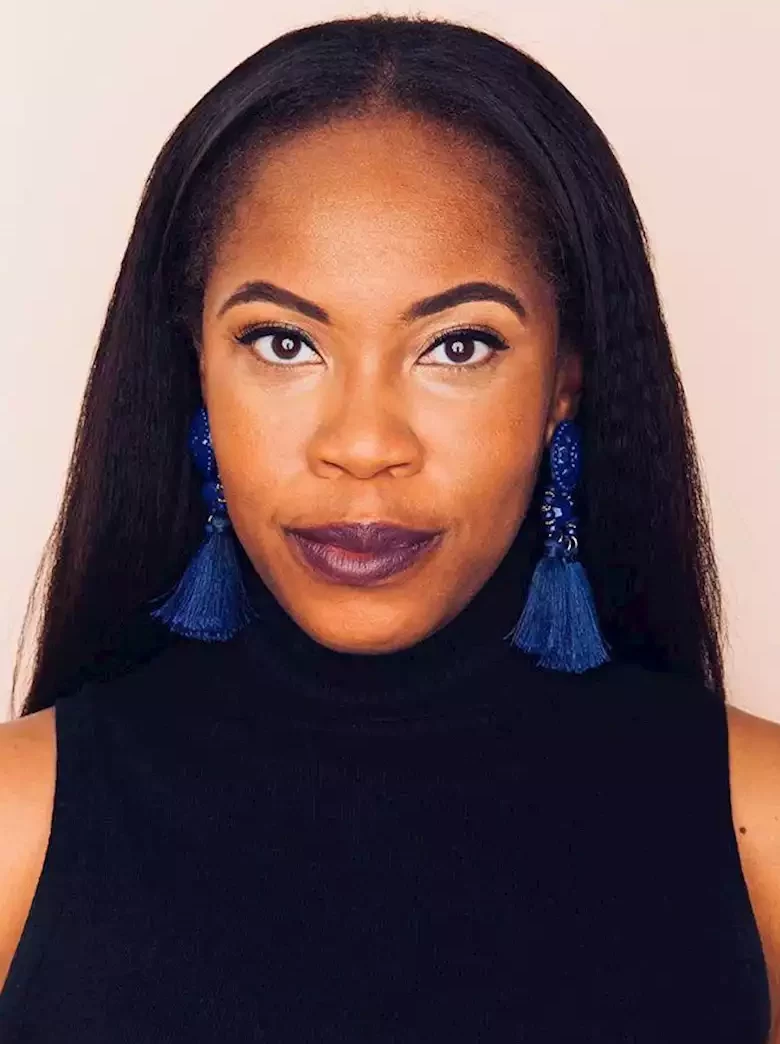 Bowe spoke as Caroline Wanga, Essence Ventures president and CEO, confirmed to Journal-isms that Danielle Cadet (pictured), who arrived at the magazine in December as executive editor and vice president of content, left the company before this summer’s Essence Festival.
Bowe spoke as Caroline Wanga, Essence Ventures president and CEO, confirmed to Journal-isms that Danielle Cadet (pictured), who arrived at the magazine in December as executive editor and vice president of content, left the company before this summer’s Essence Festival.
Wanga and Bowe joined others from OWN and Essence at the National Association of Black Journalists convention in Birmingham, Ala. There, at a panel discussion moderated by CNN correspondent Sara Sidner, Wanga defended a shift in emphasis at Essence magazine and related ventures, such as the annual Essence Festival of Culture. That event even promised an “auntie-free zone.”
Wanga said Essence would strive to appeal to Black women of all generations.
The streaming of “Time of Essence” on Warner Bros. Discovery’s flagship streaming platform is possible because the Max website now includes a dedicated OWN: Oprah Winfrey Network hub in the U.S., Warner Bros. Discovery announced on July 31. That company is a joint-venture partner in OWN, which Winfrey launched in 2011.
“Our mission at OWN is to deliver programming that serves the female Black viewer, and this cross-portfolio collaboration presents a terrific opportunity to expand on that mission,” OWN president Tina Perry said in announcing the new hub. “OWN’s premium content will not only be available to our current fans, but it will also be available to a whole new audience that can easily access our programming with this dedicated hub.”
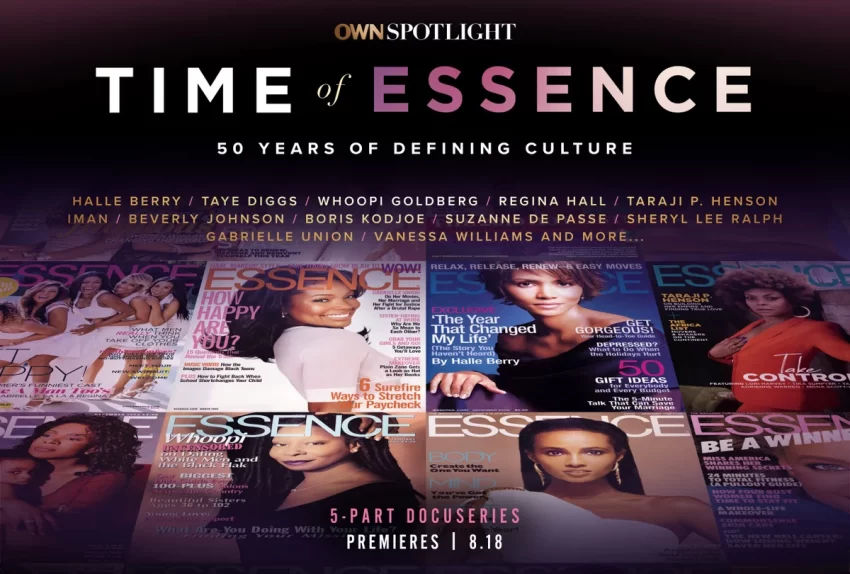
In addition to promoting “Time of Essence,” the Kenya-born Wanga, who grew up in Minnesota and had been an executive at the Target Corporation, told the NABJ audience, “People forget that Essence is a business.
“I will not apologize for the work that we’re doing to ensure that the full spectrum of Blackness that we’ve worked so hard to get permission for can live freely and doesn’t feel excluded,” Wanga said. “There are times when you may not like what it is, just don’t come. But you’re still welcome whenever you find the thing that works for you.”
Keith Spera reported on the festival June 30 for NOLA.com, writing, “For much of its history, it focused on classic R&B and largely ignored hip-hop.
“By contrast, the entire 2023 festival celebrates hip-hop’s 50th anniversary. For the first time, female rappers — Ms. Lauryn Hill, Missy Elliott and Megan Thee Stallion — headline the three nights of Superdome concerts. . . .”
Essence ran an opinion piece July 27 by Taylor Crumpton under the headline, “You Will Not Find Respectability Politics At ESSENCE Fest.” Crumpton wrote, “an abundance of culture was at the ESSENCE Festival, even parts of the culture and people which not everyone identifies with. Truthfully, there will never be a singular festival to accommodate the needs of everyone in the culture – but ESSENCE does its best.
“In the city of bounce music, in a region where twerking originated from, in a season where denim cutoffs and a sundress are the preferred outfit because of over 100-degree temperatures, the argument is being made that a Black woman from the South is degrading Black culture, even though shaking ass is what Southern Black girls have been doing all of our lives?”
Change is also what Cadet promised when she was hired in 2022. “She joins ESSENCE from Netflix’s Strong Black Lead, where she served as editorial director,“ Dominique Fluker reported in December for Forbes. Cadet also worked at The Undefeated, now Andscape, and edited HuffPost Black Voices. She was vice president of content strategy and development and managing editor at R29Unbothered, Refinery29’s digital community catering to Black millennial women.
Fluker wrote then, “In her new role, Cadet strives to shake things up a bit, as she believes there’s room for growth in how the magazine tells traditional Black stories, hoping to move the brand forward digitally. Working at the legacy publication feels like a homecoming for her, and she wants ESSENCE’s audience to do the same thing, come home. . . .”
As recently as March, Cadet told The Hollywood Reporter, “The brand has such an incredible foundation and I’m really interested in taking it into the next chapter and serving that audience of Millennial and Gen Z Black women who are entering into a different phase of life.”
 However, Wanga told Journal-isms that Cadet had not been the top editorial voice. She was functioning as a deputy to God-Is Rivera (pictured), chief content officer, and left before this year’s festival, staged June 29 to July 3.
However, Wanga told Journal-isms that Cadet had not been the top editorial voice. She was functioning as a deputy to God-Is Rivera (pictured), chief content officer, and left before this year’s festival, staged June 29 to July 3.
Rivera joined the company in May. That announcement said, “God-is Rivera, Chief Content Officer (CCO) will be joining Essence Ventures effective May 2023 as Chief Content Officer from Disney where she served as VP of Inclusive Marketing across Disney Entertainment.” Essence Ventures includes Essence Communications Inc., AFROPUNK, BeautyCon and Essence Studios.
“Prior to Disney, God-is served as the first-ever Global Director of Culture and Community experience at Twitter, where she drove strategy to make sure that campaigns and programs were connective, inclusive, and reflective of the communities Twitter served.
“Her digital-led experiences in the advertising and tech industries uplifting Black, Latinx, LGBTQ+, Disabled, and Indigenous voices will be critical as EV aims to own its role as a leader in the ever-changing consumer ecosystem.”
Cadet did not respond to requests for comment.
- Danielle Cadet, Northwestern Magazine: My Story Is Sharing Black Stories (Spring 2023)
- Tamia Fowlkes, Essence: OWN Director Of Programming Kai Bowe And Essence Ventures CEO & President Caroline Wanga Chat Upcoming Docuseries ‘Time Of ESSENCE’ During NABJ
- Ladies Leading podcast: Essence Magazine’s New Top Leader Danielle Cadet Wants to Shake Things Up (April 12)
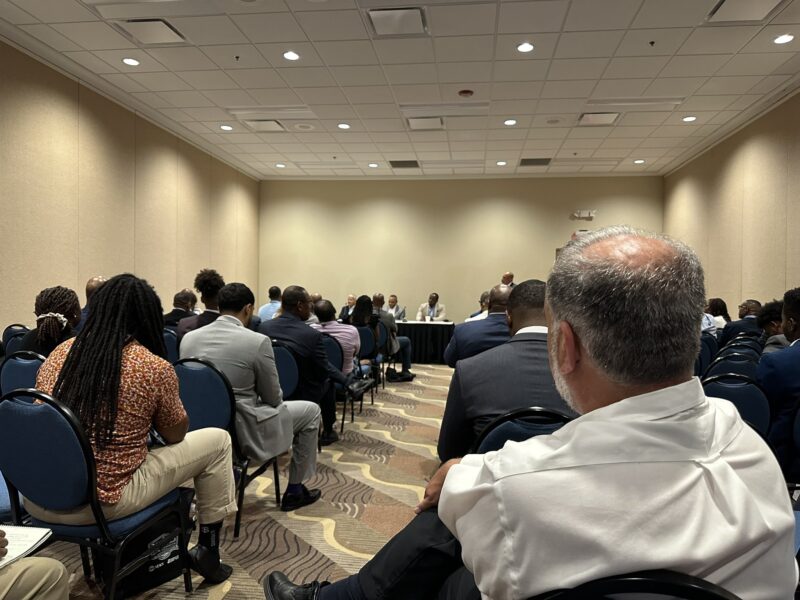
Dow Jones, NYU to Launch Workshop for Black Men
When Shirley Carswell was named director of the Dow Jones News Fund, which seeks to increase newsroom diversity by arranging for internships for high school and college journalists at well-established news organizations, she told the Journal-isms Roundtable, “I’d like to focus on the lack of Black males. Black and brown males, actually, who come through the program. In recent years, it seems like those numbers have dropped. And that’s not unusual because that’s the way journalism schools are, for the most part.”
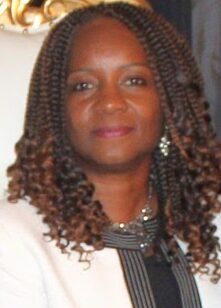 So at the end of a session Thursday on “The Present and Future of Black Male Journalists” at the Birmingham, Ala., convention of the National Association of Black Journalists, Carswell (pictured) followed up on her 2020 declaration: She announced a partnership with New York University’s Arthur L. Carter Journalism Institute to conduct “The Black Male Journalism Workshop” there starting next summer.
So at the end of a session Thursday on “The Present and Future of Black Male Journalists” at the Birmingham, Ala., convention of the National Association of Black Journalists, Carswell (pictured) followed up on her 2020 declaration: She announced a partnership with New York University’s Arthur L. Carter Journalism Institute to conduct “The Black Male Journalism Workshop” there starting next summer.
“This new program will seek to recruit and enroll an elite cohort of college students for an intensive summer training program at New York University,” the official announcement said.
The program seeks “all U.S. college students who appreciate our mission to support the representation of Black males in journalism, regardless of their identity or background,” it continues. “We particularly encourage Black males with aligned interests and career goals to apply. Students must have completed their freshman year by Summer 2024.”
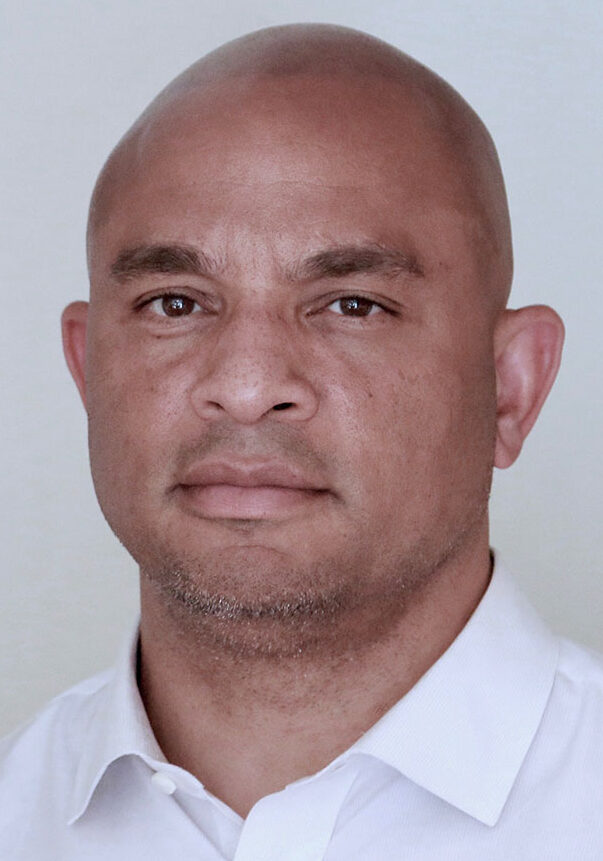 The executive director is Jason Samuels (pictured), director of graduate studies at the NYU institute and moderator of the NABJ panel, one of at least two on Black men in journalism. Separately, “Journalism in the Age of Political Extremism: Black Women on the Front Lines” focused on African American women. Topics there included the need for protection from digital abuse and harassment, and being at the intersection of racism and sexism.
The executive director is Jason Samuels (pictured), director of graduate studies at the NYU institute and moderator of the NABJ panel, one of at least two on Black men in journalism. Separately, “Journalism in the Age of Political Extremism: Black Women on the Front Lines” focused on African American women. Topics there included the need for protection from digital abuse and harassment, and being at the intersection of racism and sexism.
Panelists and the audience for “The Present and Future of Black Male Journalists” put forth myriad reasons for the underrepresentation of Black men in journalism, ranging from lack of mentors and advocates, the perception of Black men as threatening, low pay in the industry generally, unrelatable notions of “objectivity” and competition from other fields. “Some don’t even know what journalism is,” said one speaker. “They know what a podcast is.”
Carswell said the Dow Jones hopes to boost the number of young people who know what journalism is and see it as a viable profession.
Panelist Marc Lacey, a managing editor of The New York Times, said he believes that “you can actually change the world through journalism.” He also gave an example of the kind of guidance a good mentor can provide — “learning to play that chess game,” as another put it.
Lacey applied to The New York Times in 1999 while at the Los Angeles Times. He was received well at the New York organization, but his interviewer failed to mention salary. When Lacey asked, the interviewer responded with a figure lower than Lacey was already making.
Lacey explained that he needed more. He was told that those at The New York Times considered working there a calling. Lacey replied that he wasn’t asking just for himself, but for his family.
Lacey was actually single, but he received a salary that satisfied him.
- Anthony Cook, Alabama NewsCenter: Birmingham, Alabama, proves to be Magic City for NABJ convention
- Craig Newmark Graduate School of Journalism: Newmark J-School Wins Six National Association of Black Journalists Awards
- Rebecca Griesbach, al.com: Birmingham civil rights icons share local history with Black journalists: ‘For the joy of us’
- Kamryn Jackson, Andscape: National Association of Black Journalists convention panel examines the state of HBCUs (Aug. 9)
- Damaso Reyes, Solutions Journalism Network via International Journalists’ Network: How Black journalists are incorporating a solutions approach in their newsrooms (Aug. 9 and June 13)
Carol Randolph on “Harambee.” “She opened up a lot of issues on her Channel 9 morning show! A real iconic trailblazer!” said Rudolph Brewington, a D.C. broadcast colleague during the 1970s. (video)
D.C.’s Carol Randolph, ‘Extension of the Community’
Carol Randolph, a Washington, D.C., journalist and talk show host in the years after the 1960s urban uprisings, when African Americans were demanding their place in local television, died Saturday at 82.
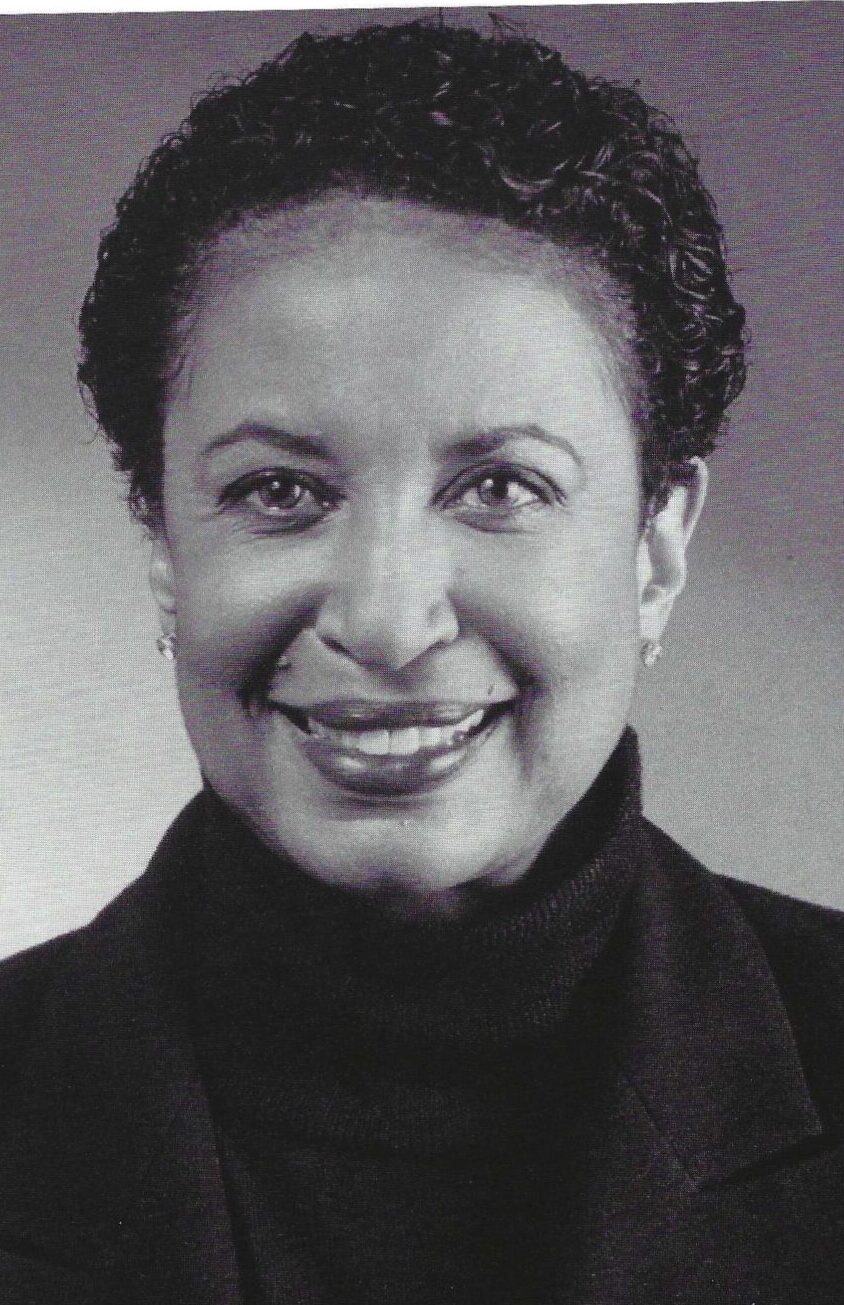 Randolph (pictured), also known as Carol Randolph-Jasmine, was later a lawyer, literary agent and analyst for Court TV. She died in hospice at her Washington home and had battled carcinoid cancer, her daughter, Jennifer Randolph, told Journal-isms Wednesday.
Randolph (pictured), also known as Carol Randolph-Jasmine, was later a lawyer, literary agent and analyst for Court TV. She died in hospice at her Washington home and had battled carcinoid cancer, her daughter, Jennifer Randolph, told Journal-isms Wednesday.
According to a short bio from the Akin and Randolph agency, which Randolph founded with her partner Wanda M. Akin, the “lawyer by profession and training, entered the television industry as co-host for Washington, DC’s morning talk show, Harambee,” on WTOP-TV, the CBS affiliate then owned by the Washington Post Co.
“With no previous media experience, she excelled for over 17 years. She acted as an extension for the community by asking tough insightful questions from the famous and not so famous. Carol’s interviews included Senator Ted Kennedy, comedian Richard Pryor, former first ladies [Rosalynn] Carter and Nancy Reagan, musical genius Stevie Wonder and many more. In 1986, Ms. Randolph left television.
“In 1987, Ms. Randolph joined the literary firm of Goldfarb, Singer & Ross, which subsequently became the firm Goldfarb, Kaufman & O’Toole, specializing in representation of authors and clients in television. Ms. Randolph was the managing [partner] from 1988 to 1991. During this time, Ms. Randolph also wrote a bi-weekly column, ‘Metropolitan Life’ for the Washington Times.”
This bio, from a site copyrighted in 2000, continues, “Presently, she is the general counsel for New African Visions, Inc., the non-profit organization responsible for editing, Songs of My People. Currently, she also serves as an anchorwoman on Court TV . . . where she analyzes live and taped trials for the millions of Court TV viewers. Carol brings a great deal of experience in ‘agenting’, particularly in the publishing world to the Akin & Randolph Agency. . . .”
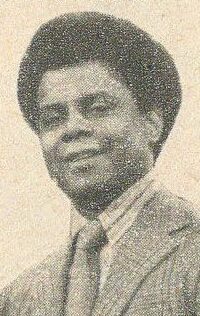 “My broadcast colleague, Carol Randolph, pioneered the strong, serious Black woman in D.C. television,” her “Harambee” co-host, Claude Matthews (pictured), messaged Journal-isms.
“My broadcast colleague, Carol Randolph, pioneered the strong, serious Black woman in D.C. television,” her “Harambee” co-host, Claude Matthews (pictured), messaged Journal-isms.
“She moved effortlessly from serious political interviews with politicians like Shirley Chisholm to poets like Amiri Baraka and musicians like Roberta Flack and Eubie Blake.
“She transcended the role expected of a Black woman of that era and was a true journalist who sought in her interviews to ask the question that she thought was on the mind of the viewer. A true crossover talent, she appealed to Black and white audiences and was as comfortable talking to people in the D.C. suburbs as she was relating to the inner-city poor. Her broadcast career navigated the path from ‘Harambee,’ a show directed at the Black community, to co-hosting ‘Everywoman,’ a program primarily for white suburbanites. She transcended categories, except that of excellence.”
Angela Owens Clark, who worked at NBC-owned WRC-TV, messaged, “Carol Randolph entered the industry with her whole self and all of her abilities — her intelligence, her confidence, her analytical skills, and her ready smile. All of that resting firmly on the foundation of her don’t-mess-with-me; I-know-what-I’m- talking-about demeanor.
“Working as a journalist was uncertain enough. Being on the cutting edge was beyond uncertain. But Carol took the risks for Harambee! And the city benefitted.”
The family obituary added, “Carol Randolph believed in the power of media to highlight Black history and culture.” The full family summary of her life follows at the end of this column.
Birmingham’s Story Resonates With NABJ
August 6, 2023
Quest for Diversity Is Part of Rights Struggle
Homepage photo: In April, the Greater Birmingham Convention & Visitors Bureau unveiled a new civil rights-branded motorcoach to commemorate the 60th anniversary of the Birmingham Civil Rights Campaign. The bus was unveiled at historic 16th Street Baptist Church, and was to travel the country to inform and educate about the significance of the Civil Rights Movement in Birmingham. (Credit: bhamnow.com)
Support Journal-ismsDonations are tax-deductible.
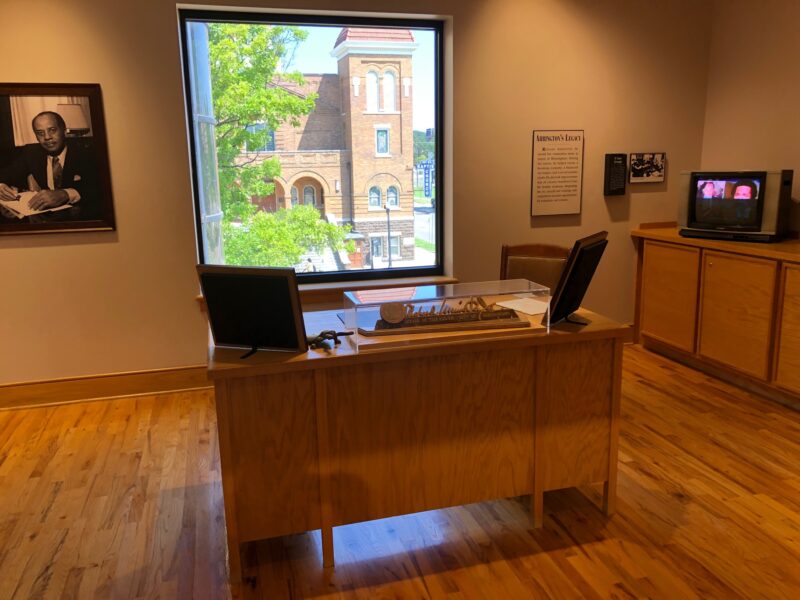
Quest for Diversity Is Part of Rights Struggle
The Birmingham Civil Rights Institute, a museum in the city once known as “Bombingham” that displays artifacts from the civil rights era there, welcomed members of the National Association of Black Journalists on Saturday. One of its displays was a replica of the office of Birmingham’s first Black mayor, Richard Arrington, who served from 1979 to 1999.
Through the window of the replica of the office, visitors could see across the streeet the historic 16th Street Baptist Church, bombed in 1963, famously killing four little girls. Depicted on the television near the mayor’s desk was footage from ABC News reporting Arrington’s groundbreaking election.
The report was anchored by Max Robinson, network television’s first Black anchor and a co-founder of the National Association of Black Journalists.
Outside, tour guide Brenda S. Wright talked about Birmingham’s Black newspapers, the Birmingham World and the Birmingham Mirror, which spread word of the movement when white newspapers did not. Wright implored the journalists, “You’ve got the wisdom to teach these kids. They’re not even listening. They’re on their cell phones.”
Choices of convention sites make a statement, a truism starkly demonstrated by NABJ’s selection of this Alabama city — however belatedly, as some thought it too small and lacking in pizazz — for the 2023 annual gathering.
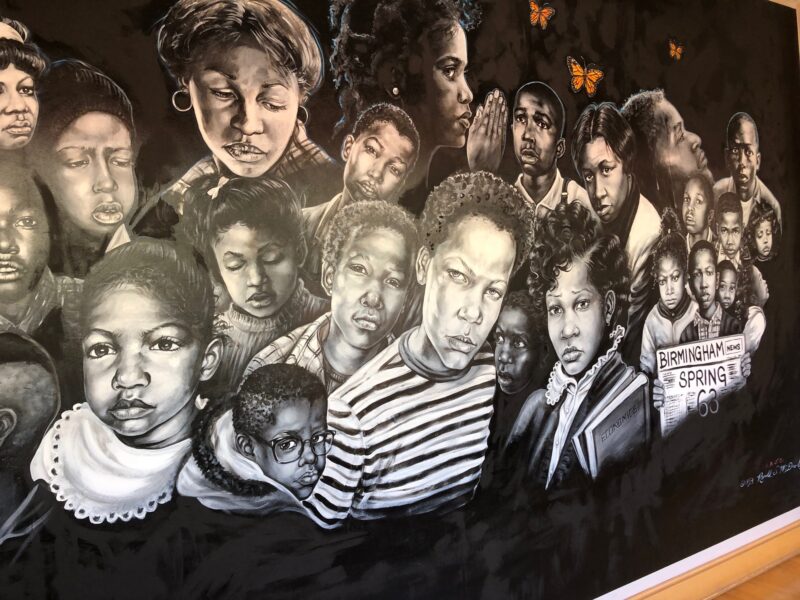
Ten years ago, Paul Cheung was the new president of the Asian American Journalists Association. He visited the NABJ convention then, and told Journal-isms at the time that he found motivation there. “I could really see the civil rights origins” of NABJ, Cheung said. “For AAJA and the other groups, we didn’t come into development” until later. “NABJ led the movement, and to see it was inspiring.”
And so it went Saturday night, when NABJ held its Salute to Excellence Awards Gala in the Sheraton Birmingham Hotel, adjoining the Birmingham-Jefferson Convention Complex in the “Magic City.”
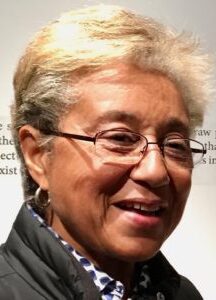 Marquita Pool-Eckert (pictured), the first Black woman in a senior producer position at CBS News, won the Chuck Stone Lifetime Achievement Award. As a young person, she said, she was inspired by the televised news reports about the burgeoning civil rights movement. “I have come full circle in Birmingham,” Pool-Eckert told the crowd, “the place that sparked my interest in television news.” History-making Black journalists Frederick Douglass, Ida B. Wells, Alice Allison Dunnigan, Les Payne, Robert C. Maynard, Chuck Stone and others “each ran their laps and passed the baton.”
Marquita Pool-Eckert (pictured), the first Black woman in a senior producer position at CBS News, won the Chuck Stone Lifetime Achievement Award. As a young person, she said, she was inspired by the televised news reports about the burgeoning civil rights movement. “I have come full circle in Birmingham,” Pool-Eckert told the crowd, “the place that sparked my interest in television news.” History-making Black journalists Frederick Douglass, Ida B. Wells, Alice Allison Dunnigan, Les Payne, Robert C. Maynard, Chuck Stone and others “each ran their laps and passed the baton.”
 Jim Trotter (pictured) of The Athletic, Journalist of the Year, praised many of his mentors and heroes, among them the late broadcast journalist Lee Thornton, journalism professor and White House reporter who demonstrated that “We didn’t get here by ourselves,” and sports columnist Ralph Wiley, who made an impression as “a Black man speaking unapologetically about our Blackness.”
Jim Trotter (pictured) of The Athletic, Journalist of the Year, praised many of his mentors and heroes, among them the late broadcast journalist Lee Thornton, journalism professor and White House reporter who demonstrated that “We didn’t get here by ourselves,” and sports columnist Ralph Wiley, who made an impression as “a Black man speaking unapologetically about our Blackness.”
Trotter, longtime pro football reporter, had publicly challenged NFL commissioner Roger Goodell on the lack of diversity off the field and within the NFL Media Group — where Trotter worked. This year, his contract wasn’t renewed and he signed on with The Athletic..
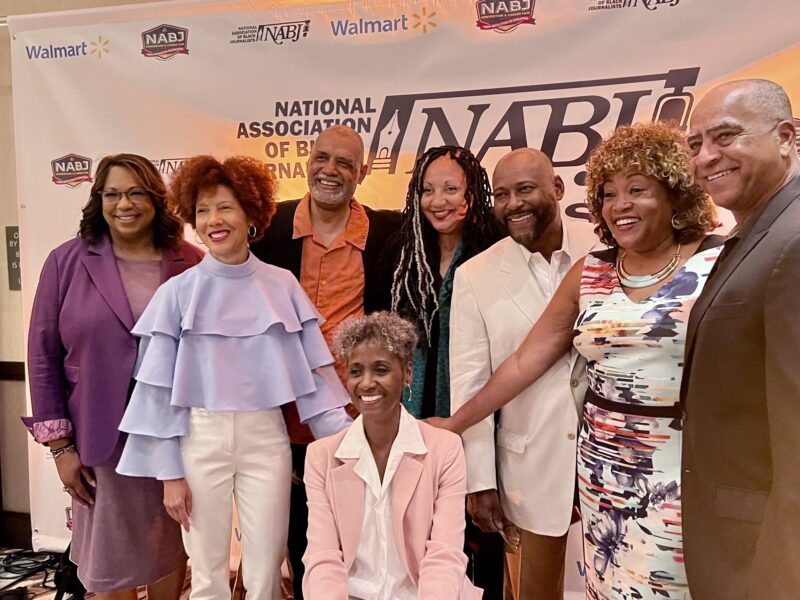
Trotter recalled being assigned to cover Colin Kaepernick after the former San Francisco 49ers quarterback refused to kneel during the national anthem at a 2016 preseason game. Kaepernick was protesting police treatment of people of color, but critics portrayed Kaepernick as unpatriotic and disrespectful.
One voice in Trotter’s head came from the studio, urging Trotter to ask questions about Kaepernick’s alleged disrespect. But another asked Trotter whether he was going to allow someone else to dictate that he would cover Kaepernick “in a negative way.
“Since then, that has been my focus — to give a voice,” not to the voiceless, but “to those whose voices aren’t being heard,” Trotter said. He also became determined to portray people by, in the words of journalist and author David Brooks, their “eulogy virtues,” or “who you are as a person,” rather than by one’s resume.
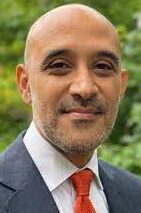 The universality of the quest for civil rights, and diversity in journalism, was exemplified by the choice of British journalist Marcus Ryder (pictured) — a diversity advocate — for the Percy Qoboza Foreign Journalist of the Year Award. Ryder cited figures showing the disproportionately low numbers of journalists of color in Britain, and observed, “We are seeing Black Lives Matter through a white prism.” He accepted the award “on behalf of all the Black journalists who have glass ceilings, but continue to produce amazing work.”
The universality of the quest for civil rights, and diversity in journalism, was exemplified by the choice of British journalist Marcus Ryder (pictured) — a diversity advocate — for the Percy Qoboza Foreign Journalist of the Year Award. Ryder cited figures showing the disproportionately low numbers of journalists of color in Britain, and observed, “We are seeing Black Lives Matter through a white prism.” He accepted the award “on behalf of all the Black journalists who have glass ceilings, but continue to produce amazing work.”
Add to that quest the North Carolina-based Scalawag, winner of the “Best Practices” award. Cierra Hinton, executive director and publisher, described the magazine as “Black-led and Black-centered, always and forever Southern, Black and queer and abolitionist, and so am I.” Her website says, “More often than not, media is used to sustain white supremacy and racism, classism, patriarchy, homophobia and transphobia, and xenophobia. Scalawag is here to prove that it can be used to dismantle systemic oppression and redistribute power too.” (There was no “Thumbs Down” award this year.)
Outgoing NABJ President Dorothy Tucker bestowed her final President’s Award on Paula Madison, CEO of Madison Media Management and former NBCUniversal executive, longtime NABJ member and insider.
Madison said she was starting her own news leadership program and had invited fellow broadcast journalists to gather other Black news directors to meet. The number started small, but grew to 15 by the time of their scheduled session, and included three assistant news directors.
Madison told the group that their numbers must grow, and said that would happen not because Madison would mentor them, but because “you will be mentoring each other.
“If y’all aren’t fed up because of where we are right now, then you shouldn’t be here,” she told the audience, adding expletives for effect.
Tucker, honored as she closed out two terms as president, reiterated, “What we do matters. As journalists, we ought to be fighting for stories that tell the stories about Black America,” a sentiment seconded by her successor, broadcast journalist Ken Lemon. Until Sunday he was vice president/broadcast. “You can’t slow down,” Lemon said. “NABJ stand — I will stand with you.”
Watching it all was Kevin McIntyre, a Black engineer whose wife, Washington Post personal finance columnist Michelle Singletary, was given the Legacy Award at a Friday ceremony.
McIntyre called the ceremony “eye opening and inspiring.” He said the array of winning entries in the Salute to Excellence contest inspired him to read or view the winners. As journalists are witnesses to history, he said, “I want their perspective — to see it through the eyes of someone who looks like me.”
One winning entry stood out, he said. It was by Barnett Wright of the Birmingham Times, in the “Newspaper” category, staff of 50 and below: “ ‘Fifth Little Girl’ in Birmingham Church Bombing and Her Nurse at Hospital Reunite — After 6 Decades.”
Full circle, as Pool-Eckert said.
- Deborah D. Douglas, Moon.com: U.S. Civil Rights Trail: A Traveler’s Guide to the People, Places, and Events that Made the Movement (book) (January 2021)
- Jaime C. Harris, New York Amsterdam News: Rob Parker, pioneering sports journalist, to be inducted into the NABJ Hall of Fame
- National Association of Black Journalists: NABJ Announces 2023 Salute to Excellence Nominees (May 22)
- Elijah Pittman, NABJ Monitor: NABJ and NAHJ Divorce: What Happened?
- Samuel Robinson, Axios: Why They Left: Detroiters at NABJ in Birmingham
- WBRC-TV, Birmingham, Ala.: National Association of Black Journalists Hosts annual convention in the Magic City, massive economic impact expected
- NABJ Monitor coverage
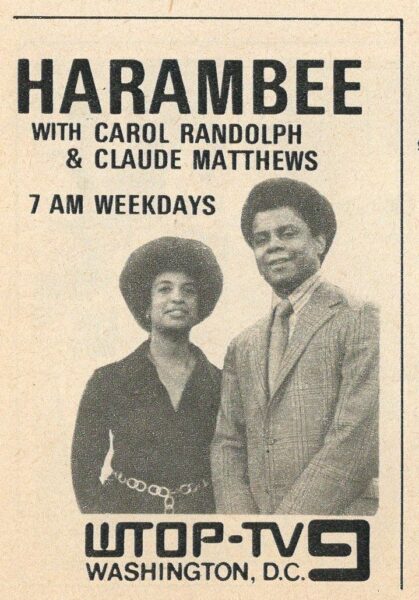
Family Obituary for Carol Randolph
Carol Randolph, television anchor, mother, wife, sister, aunt, grandmother, and dear friend, passed away on Saturday, August 5, 2023, after a long and courageous battle with carcinoid cancer,
Carol was known locally and nationally as a notable broadcast pioneer who emerged in the shadows of the turbulent 60s.
Born in St. Louis, MO, Carol grew up in a legacy of education, with three generations of college-educated leaders on both sides of her family. After earning a Bachelor of Arts degree from Fisk University and a Master of Arts in Education degree from Washington University (St. Louis), Carol began her career teaching biology in St. Louis. In August 1963, she was among the thousands of college students arriving from all over the country to attend the March on Washington for Jobs and Freedom, where they heard the electrifying speech of Dr. Martin Luther King, Jr.
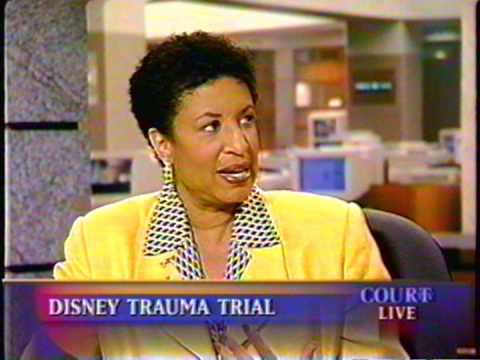
Washington, D.C. was a beacon to Carol, where her life and career centered on education and family. Arriving in Washington at the end of the tumultuous sixties, Carol worked in the city’s antipoverty program and administered an employment program for the United Planning Organization before becoming co-host of “Harambee,” the city’s first daily talk show on issues and interests in the black community. While hosting the show, Carol enrolled in and earned her Juris Doctorate from Catholic University. In 1987, she joined the literary firm Goldfarb, Singer & Ross, representing authors and clients in media and television. Further, she served as general counsel for New African Visions, Inc, the nonprofit organization responsible for editing the book, Songs of My People, for publication in 1992.
Carol Randolph believed in the power of media to highlight Black history and culture. In a broadcast career that started with Harambee and spanned nearly two decades, Carol hosted a series of television programs in Washington, D.C., including Everywoman, Nine in the Morning, Morning Break, and finally The Carol Randolph Show. Carol was a partner with Akin & Randolph, a New York based management firm that represented authors, artists, and athletes. She wrote a bi-weekly column “Metropolitan Life” for the Washington Times newspaper. She joined Court TV as a news analyst on national headlines and was host/moderator of the award-winning show, Your Turn, putting a spotlight on issues such as prayer in school, depression and suicide, and gun control.
Drawing on the experience and expertise from her impactful career, Carol was invited to lead Legal Affairs for Walls Communications, a black-owned Washington, DC public affairs firm.
After career and technical education programs had been discontinued in the DC Public Schools, Carol worked with business, community, and education leaders to generate renewed interest in construction trades education and training. In 2006, Carol joined Miller & Long Co., Inc., and co-founded the Academy of Construction and Design, a school-aligned program offering students of the District of Columbia, critical skills, pre-apprenticeship credentials, and access to opportunities in the construction industry.
Carol is preceded in death by her parents, John and Clarice Davis, and husband Frank J. Jasmine, who also served in various high-ranking government positions in New York and Washington D.C. She leaves to celebrate her life, daughter Jennifer Randolph; son Jonathan Jasmine ([wife is] Rachel); Brothers John Davis and Alan Davis ([wife is] Diana); granddaughters Ruby, Malin and Naila; and several beloved nieces and nephews who brought her great joy. She was an active alumni member of the Alpha Kappa Alpha Sorority (The Pearls), the Links Incorporated, and Jack And Jill of America.
A memorial to celebrate her life will be announced at a future date. If you would like to honor Carol Randolph, please consider donating to The Carcinoid Cancer Foundation. (Added Aug. 9)
To subscribe at no cost, please send an email to journal-isms+subscribe@groups.io and say who you are.
Facebook users: “Like” “Richard Prince’s Journal-isms” on Facebook.
Follow Richard Prince on Twitter @princeeditor
Richard Prince’s Journal-isms originates from Washington. It began in print before most of us knew what the internet was, and it would like to be referred to as a “column.” Any views expressed in the column are those of the person or organization quoted and not those of any other entity. Send tips, comments and concerns to Richard Prince at journal-isms+owner@
View previous columns (after Feb. 13, 2016).
View previous columns (before Feb. 13, 2016)
- Diversity’s Greatest Hits, 2018 (Jan. 4, 2019)
- Book Notes: Is Taking a Knee Really All That? (Dec. 20, 2018)
- Book Notes: Challenging ’45’ and Proudly Telling the Story (Dec. 18, 2018)
- Book Notes: Get Down With the Legends! (Dec. 11, 2018)
- Journalist Richard Prince w/Joe Madison (Sirius XM, April 18, 2018) (podcast)
- Richard Prince (journalist) (Wikipedia entry)
- February 2018 Podcast: Richard “Dick” Prince on the need for newsroom diversity (Gabriel Greschler, Student Press Law Center, Feb. 26, 2018)
- Diversity’s Greatest Hits, 2017 — Where Will They Take Us in the Year Ahead?
- Book Notes: Best Sellers, Uncovered Treasures, Overlooked History (Dec. 19, 2017)
- An advocate for diversity in the media is still pressing for representation, (Courtland Milloy, Washington Post, Nov. 28, 2017)
- Morgan Global Journalism Review: Journal-isms Journeys On (Aug. 31, 2017)
- Diversity’s Greatest Hits, 2016
- Book Notes: 16 Writers Dish About ‘Chelle,’ the First Lady
- Book Notes: From Coretta to Barack, and in Search of the Godfather
- Journal-isms’ Richard Prince Wants Your Ideas (FishbowlDC, Feb. 26, 2016)
- “JOURNAL-ISMS” IS LATEST TO BEAR BRUNT OF INDUSTRY’S ECONOMIC WOES (Feb. 19, 2016)
- Richard Prince with Charlayne Hunter-Gault, “PBS NewsHour,” “What stagnant diversity means for America’s newsrooms” (Dec. 15, 2015)
- Book Notes: Journalists Follow Their Passions
- Book Notes: Journalists Who Rocked Their World
- Book Notes: Hands Up! Read This!
- Book Notes: New Cosby Bio Looks Like a Best-Seller
- Journo-diversity advocate turns attention to Ezra Klein project (Erik Wemple, Washington Post, March 5, 2014)
Post showed 518 page views at 6:03 a.m. on Aug. 9, then 355 at 8:55 a.m. Aug. 9

